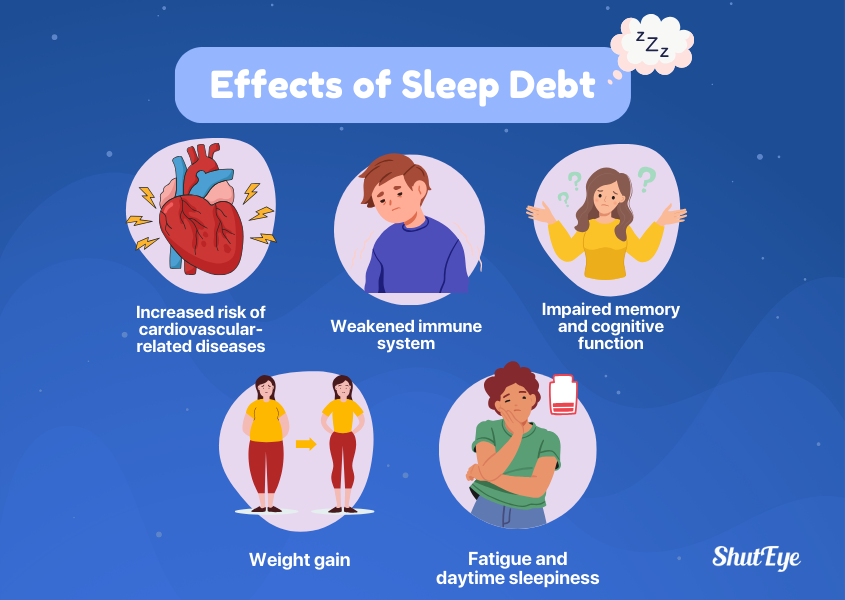


If you constantly feel tired and sluggish during the day, you might be dealing with sleep debt.
In this article, we’ll explore the hidden consequences of poor rest and how it can negatively impact your physical and mental health. From increased risk of chronic diseases to impaired cognitive function, sleep debt can have far-reaching effects.
Yes, sleep debt is a real thing. It refers to sleep deficit. It is the difference between how much sleep you need versus how much you actually get.
When you sleep fewer hours than what your body requires, you will fall into a sleep debt. This may take days to recover from.
Sleep debt can have numerous negative effects on your health and well-being. When you consistently don’t get enough sleep, it can lead to what’s known as sleep debt. This hidden consequence of poor rest can have significant impacts on your body and mind.
The effects of sleep debt can include:
It’s important to address sleep debt and prioritize getting enough rest to maintain optimal health and well-being.

How can you effectively recover from sleep debt? Recovering from sleep debt begins by prioritizing sleep and making it a priority in your daily routine.

Practice good sleep hygiene by creating a sleep-friendly bedroom environment and maintaining a consistent sleep schedule. Taking a brief 10 to 20-minute nap during the day can help increase feelings of refreshment and improve cognitive function temporarily. However, it’s important to note that napping isn’t a replacement for lost sleep.
While sleeping in on weekends may help ease symptoms like fatigue or daytime sleepiness, it may not fully compensate for sleep debt.
Prioritizing sleep during your daily routine is crucial for maintaining optimal health and well-being. Adequate sleep plays a vital role in your overall physical and mental health. Here are two reasons why sleep is important:
Restorative Function: During sleep, your body goes through important processes that help repair and rejuvenate your cells, tissues, and organs. It’s during this time that your body can regulate hormones, strengthen your immune system, and support the growth and development of your brain. Getting enough sleep allows your body to function at its best and promotes overall well-being.
Cognitive Function: Sleep is essential for cognitive processes such as memory consolidation, attention, and problem-solving. When you’re well-rested, you’re better able to focus, concentrate, and make decisions. On the other hand, sleep deficiency can impair your cognitive abilities, affecting your productivity, learning, and overall performance in daily activities.

Maintaining regular sleep patterns and addressing sleep debt are crucial steps in recovering from prolonged sleep restriction. Recovery sleep is essential to restore optimal brain function and cognitive performance. Chronic sleep deprivation and prolonged sleep restriction can have negative effects on memory, concentration, and overall well-being.
To recover, prioritize sleep and make it a priority in your daily routine. Practice good sleep hygiene by creating a sleep-friendly bedroom environment and establishing a consistent sleep schedule. Taking short naps can help alleviate symptoms of sleep debt, but they aren’t a replacement for lost sleep.
While sleeping in on weekends may provide temporary relief, it may not fully compensate for sleep debt. Remember, it takes time for the body to fully recover from sleep restriction. Full recovery can take up to nine days.
To ensure optimal health and well-being, it’s important for you to understand the recommended sleep hours and the benefits of napping.
Here are some key points to consider:
To avoid sleep debt, prioritize getting enough rest by following these steps:
By implementing these strategies, you can avoid the hidden consequences of poor rest and maintain optimal health and well-being.
Prioritize sleep by making it a priority in your daily schedule. To evoke an emotional response in you, consider the following:
Benefits of healthy sleep habits:
Consequences of sleep disruptions:
To maintain healthy sleep, establish a consistent sleep schedule and allocate enough time for the recommended amount of sleep. Create a bedtime routine to signal your body that it’s time to sleep and ensure a comfortable sleeping environment. Limit alcohol and caffeine intake, reduce the use of electronic devices at night, and seek further recommendations from reputable sources.
Prioritize your sleep to reap the benefits of a well-rested body and mind.
So, if you’re tired of feeling tired, it’s time to prioritize your sleep. By understanding the hidden consequences of sleep debt and implementing strategies to avoid and recover from it, you can improve your overall well-being.
Banks, S., & Dinges, D. F. (2007). Behavioral and physiological consequences of sleep restriction. Journal of clinical sleep medicine : JCSM : official publication of the American Academy of Sleep Medicine, 3(5), 519–528.
BetterHealth (n.d.) Sleep Deprivation [online]. https://www.betterhealth.vic.gov.au/health/conditionsandtreatments/sleep-deprivation